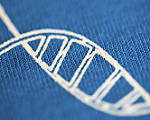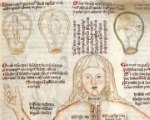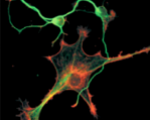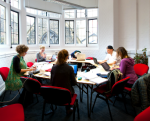Choosing your Minor Subject
Once your Major Subject has been confirmed, the Faculty Office will ask you to state your preferred Minor Subject by 1st September. Some Minor Subjects have limited places, and if these are over-subscribed the departments concerned will select their own students.
On this page you will find information to help you choose your Minor Subject:
- The list of departments offering Minor Subjects in 2025-26 with outward links
- A short description of each Minor Subject
- Contact details for Minor Subjects
Departments offering BBS Minor Subjects for 2025/26
Click on the tiles below to visit corresponding departmental webpages
| Paper | Short Description (see links for more detailed information) |
|---|---|
Minor Subjects short description (These subjects are available for the Academic Year 2025/26)The links below are, when possible, specific to a given Minor subject. | |
| 104 - Human Evolution | This course provides an in depth exploration of the evolutionary history of humans and hominins. The paper looks at human evolution from ca. 10 million years ago to 10,000 years ago. Contact hours: 27h Maximum 10+ candidates
|
| 105 - Human Ecology and Behaviour | This paper examines human and other primate behaviour in a broad comparative perspective. Non-human primate social communication across all sense modalities will be reviewed in the context of the social organization of the various primate species. The paper will also consider what primate and human communication have in common, and will discuss the evolution of human language. Contact hours: 32h Maximum 10+ candidates
|
| 107 - Philosophy & Ethics of Medicine | Do we have a human right to health? What is it to be healthy anyway, and can good health be measured? How can we know that smoking causes lung cancer, rather than that they are merely correlated? Is it ethical to experiment on humans to gain that knowledge? Is the foetus a person, and does this affect the morality of abortion? How should we decide between funding basic science and applied studies? Medical practice raises significant philosophical, ethical and political questions. This course studies these questions and shows how different answers may influence practice. Contact hours: 24h lectures + 4-6h supervisions Maximum 20 candidates |
| 108 - Health, Medicine and Society | This paper provides students with a critical survey of principal themes and debates in contemporary medical sociology. It explores the major social causes of health and illness in modern societies, with special reference to such factors as social class, gender, ethnicity, and age; provides students with a sociological grasp of the issues and problems associated with chronic illness; investigates a variety of key topics in the sociology of mental health; and, finally, develops a sociological analysis of the major organisational, professional and technological components of medical practice in contemporary society. Contact hours: 20h Please note that this papers is capped. Places will be confirmed by the Sociology department on the 16 September. Students are advised to choose an alternative paper to avoid disappointment |
| 109 - The Family | Psychological and sociological perspectives on family relationships, kinship and child development are examined in relation to specific topics such as motherhood, fatherhood, adolescence, marriage and divorce, single-parent and step-families, lesbian and gay families, and families created by assisted reproduction. Contact hours: 32h Maximum 10 candidates |
| 111 - Higher Order Brain Function and Dysfunction | This module aims to give students an understanding of important principles in contemporary neuroscience at cellular and molecular levels. The lectures will cover voltage-dependent ion channels and their role in electrical signalling, ligand-gated ion channels and their role in synaptic transmission, intracellular signalling in neuromodulation and synaptic plasticity, sensory transduction mechanisms, and cellular techniques applied to circuit neuroscience. The module introduces concepts that will be useful for a deeper understanding of brain function. Maximum 10 candidates |
| 113 - Early Medicine | This paper covers medical knowledge and practices in the medieval and early modern periods. Themes include tradition, innovation and the transmission of knowledge; the value of reason and experience; patient-practitioner relationships; gender and medicine; pluralism and the marketplace; understandings of the body and disease; medicine, magic and religion. Contact hours: 24h lectures + 4-6h supervisions Maximum 12 candidates |
| 114 - Modern Medicine & Biomedical Sciences | Born in hospitals, vaccinated, X-rayed, taking antibiotics, receiving transplants – medicine sets the parameters of our lives. Since a great deal of biology, chemistry and physics has been and continues to be done as part of medicine, it is also central to HPS. This paper is about how, and with what consequences, a new, scientific medicine was made for the modern world. The Michaelmas Term course surveys the creation since 1750 of new medical institutions, professionals and practices. The Lent Term course explores the 20th-century transformation of medicine into a major object of economic, political and ethical concern. Contact hours: 24h lectures + 4-6h supervisions Maximum 12 candidates |
| 120 - Genetics of Health & Disease | Human genetics has always had to exploit technology to obtain answers to the problems it poses. The module explores how we can use information from the Human Genome Project, together with methods for analysing gene expression and function at the whole-genome scale (Systems Biology) to improve our understanding of human biology. Contact hours: 26h Maximum 10 candidates |
| 121 - Evolutionary Genetics & Adaptation | This module will consider the process of evolution, by looking at studies on genetic variation in populations, together with theoretical examinations of the way that genes behave in populations. Contact hours: 26h Maximum 10 candidates |
124 - Advanced Topics in Social and Applied Psychology
| This course will include the following lecture topics: Advanced Topics in Personality and Individual Differences, Applying Behavioural Insights and Influence and Persuasion in the Digital Age. Maximum 7 candidates |
| 126 - Topics in Music & Science: Exploring Music Psychology | Musicality is a uniquely human phenomenon that spans diverse aspects of human biology and psychology, such as pitch perception, auditory scene analysis, entrainment, prediction, motor control, and memory. The Music Psychology course addresses this fascinating topic in two strands. One strand involves learning about a collection of core topic areas in music psychology. This year’s core topic areas are the following: Emotion expression in music, music and consumer behaviour, music and health, music and media, music in everyday life. The second strand will focus on scientific methods used in music psychology, with examples stemming from the core topic areas. The scientific methods sessions will encourage students to engage with qualitative and quantitative study designs and formulate their assessment on the strengths, limitations, and considerations of a selection of approaches in music psychology. Students are not expected to have any statistical/mathematical knowledge. The course is taught in 8 x 2-hour lecture in Michaelmas Term. The course will be assessed via a three-hour handwritten exam. Maximum 3 candidates. This course does not have strict prerequisites. However, it will be helpful if the student has some knowledge of Western music theory (e.g. able to read music notation) and of psychological research methods (e.g. knowledge of standard research designs and statistical tests). |
| 127 - Conservation Science | This interdepartmental course, taught by the Departments of Zoology and Plant Sciences, aims to provide an understanding of why wild nature is currently in decline, why this matters, and how biology coupled with other disciplines can be harnessed to identify potential solutions. The course begins by explaining the distribution and importance of biodiversity, and the evidence that it is currently being lost. It then examines in detail the immediate threats to wild populations and their habitats, and the underlying drivers of those threats. The final section of lectures explores potential solutions, combining socio-economic as well as biological insights to take a constructively critical look at approaches ranging from sustainable harvesting and ecosystem restoration to agri-environment schemes and the marketing of ecosystem services. Core lectures are supplemented by case studies given by outside experts on policy and conservation practice. There is also a careers session, a class debate, an industry workshop and a guided tour round various conservation organisations based in the David Attenborough Building. |
| 129 - Applied Clinical Research | The aim of the module is to provide students with knowledge, skills and practical experience to understand the importance and challenges of applied clinical research and to offer a platform for developing further expertise in it during their clinical studies and beyond. Should they wish, students will be able further to develop their work in this module, through Student Selected Components in Year 4 of the Cambridge Clinical Course. The course is open to applicants from both MVST and NST, although it is anticipated that it is likely to appeal more to the former. There are no essential or desirable pre-requisite courses that applicant students should have studied previously in either Tripos. Maximum 12 candidates, minimum of 9. |
| 132 - Evolution and Comparative Anatomy of Mammals | In this module, we examine the evolution of ourselves and our closest relative, from an ancestor that existed over 300 million years ago to the diversity of bats, whales, lemurs, rabbits, elephants, sloths, koalas, echidnas and many other living species. Using the Tree of Life and comparative anatomy as our guides, we will explore how mammals adapt and thrive everywhere, from deserts and oceans and from poles to tropics. We note how genomics have revolutionized our understanding of Life's evolutionary tree, yet also confirmed basic ideas about this Tree outlined in the 19th century. We explore links between DNA and development, and consider how genomes can exhibit their ouw fossil record. We will observe the extraordinary commonalities shared by animals as diverse as blue whales and tarsiers, and the major differences between animals that at first glance appear to be similar, such as talpid and afrotherian moles. We furthermore consider the "Ice Age", the rich and growing field of palaeogenetics, ther emergence of humanity, and the profound effects of domestication on animal morphology and behaviour. We note key lines of evidence that document climate variability and the responses of species to repeated changes in ice cover and sea levels, fluctuations which help explain, among many other phenomena, the distinctive yet essentially European identity of the British Isles. Biological natural science students taking this course will recognize themes from their first two years, such as development, reproduction and ecology. Vets and medics will be familiar with anatomical concepts, computerized tomography, and histological data used in our course. All students will appreciate how the anatomy of humans, their livestock and pets exhibit commonalities and contrasts with non-model species, from armadillos to Thrinaxodon. Ecologists, cell-biologists and any other Part II student will recognize topics concerning our own biology and place in the Tree of Life. This is an independent, self-contained module and there are no prerequisties needed to do well in the course. |
| 134 – From Genome to Proteome | This BBS minor subject comprises Module B from the Part II Biochemistry course. This course examines all steps in eukaryotic gene expression, from chromatin accessibility through to translation and mRNA turnover. Particular emphasis is paid to: regulation of gene expression, the co-transcriptional nature of RNA processing, functional coupling between different steps in gene expression, the impact of global and “systems” level approaches to understanding gene expression. The course consists of 24 hours of core lectures. Q+A sessions as offered by some lecturers in addition. Specialized supervisions in small groups are available for any student who requests them. These are student organized with guidance for the Department of Biochemistry. Contact hours: 24h Maximum 10 candidates – Selection criteria |
| 135 – Cell Cycle, Signalling and Cancer | This BBS minor subject comprises Module D from the Part II Biochemistry course. The themes of this course draw on most modern biological techniques and impinge on core cell and molecular biology topics of cellular signalling, DNA replication, DNA repair, cell cycle and apoptosis amongst others. There is a particular emphasis on cancer biology and therapeutic intervention with lectures on oncogenes and tumour suppressors, experimental systems, tumour metabolism and imaging, virology and therapeutic strategies. The course consists of 24 hours of core lectures. Q+A sessions as offered by some lecturers in addition. Specialized supervisions in small groups are available for any student who requests them. These are student organized with guidance for the Department of Biochemistry. Contact hours: 24h Maximum 10 candidates – Selection criteria |
137 - Surgical and Radiological Anatomy
| This course introduces students to areas of anatomy that are especially relevant to surgical and radiological procedures. The need for a good working knowledge of anatomy in surgical and radiological practice is of course paramount in clinical safety. Applicants for Core Surgical Training and Specialty Radiology Training may improve their scores in the “Experience in and commitment to specialty” component by having chosen to take a relevant module such as this course. Students also choose one practical activity from the following options: attendance at operating theatre sessions; diagnostic and/or interventional radiology session; or preparation of an anatomical prosection. Assessment includes a 1-hour Short Answer Questions paper, a short written report and oral presentation on the practical session. Lecturers are current consultant radiologists and surgeons. Contact hours: 24h |
138 - Developmental Neurobiology
| This module addresses how the nervous system is assembled during embryonic development. Although we now understand a considerable amount about the processes involved, many fascinating questions remain. This module will explore: the formation of the vertebrate neural tube; how this is patterned to generate distinct neuronal and glial cell fates in different regions; the formation of the peripheral nervous system from the migratory neural crest and cranial neurogenic placodes; the process of axon guidance; how axons make and refine the synapses that will generate functional neural circuits; how circuit designs lead to function; and the nervous system evolution (‘evo-devo’). Contact hours: 24h Maximum 5 candidates |
142 - Development and Stem Cells
| The transformation of a fertilised egg into an embryo encompasses a series of fundamental cellular events that culminate in the divergence of the embryonic and extra-embryonic cell lineages. During this process the initial totipotent egg generates cells that, progressively become restricted to different fates. The first differentiation event is a separation between extra-embryonic trophectoderm and the pluripotent embryonic inner cell mass, and the second, within the inner cell mass, between the embryonic epiblast and the extra-embryonic primitive endoderm. In this module we will explore how these cell fate decisions are taken and what transcriptional networks and epigenetic modifications reinforce them. We will also consider subsequent functions of the extra-embryonic lineages, and how interactions between the trophectoderm and the maternal tissues lead to implantation and establishment of a successful pregnancy. Contact hours: 24h Maximum 5 candidates |
143 - Systems and Clinical Physiology
| Systems physiology is central to the practice of scientific medicine. The idea behind this module is to give you a more detailed view of some aspects of systems physiology and to include some clinically oriented material that is of particular importance to the practising doctor. Cardiovascular topics include cardiac arrhythmias, the genetics and energetics of heart failure and a look at the pulmonary circulation from a clinical viewpoint. Renal physiology includes autoregulation, osmoregulation and acute and chronic renal failure. Several areas of endocrine physiology are explored in the form of pancreatic islet and gut hormones, brain control of food intake, the ever increasing problem of diabetes mellitus and the physiology and pathophysiology of bone. Contact hours: 24h Maximum 5 candidates |
144 - Plant Signalling Networks in Growth and Development
| In this lecture course you will learn about the components of signalling systems involved in physiological and developmental responses to the environment and how these components are organised into elegant networks. The lecture material will introduce you to the elements that make up signalling networks and also place these elements in context. Contact hours: 24h |
145 - Microbes: Evolution, Genomes and Lifestyle
| This course explores microorganisms with relevance to understanding plant biology including the major groups of microbes, the environmental and evolutionary transition of microbes to endosymbiotic organelles, as well as beneficial and detrimental interactions between plants and microbes. Contact hours: 24h |
146 - Evolution and Ecosystems Dynamics
| The phylogenetic progression of land plants allows us to relate palaeohistorical origins, from algae to bryophytes and lycopods, to their evolutionary progression through ferns and conifers to angiosperms. The module will examine the molecular basis to morphological advances, as compared to the physiological progression. The diversity engendered within, and beneath forest canopies, and the historical ecology of today’s landscape, complete our review of vegetation history and dynamics. Contact hours: 24h |
147 - Plant Genomes and Synthetic Biology
| Dobzhansky said in 1973 that “nothing in biology makes sense except in the light of evolution”. In 2015 he might have gone on to point out that “genomes reflect evolution and so we can make sense of biology by studying genomes”. He would be able to make this point because, from next generation sequencing and other powerful new methods, we now appreciate that nuclear genomes are much more than a linear array of coding sequence genes. They are a complex array of structural and regulatory components interspersed with genes for both coding and non coding RNAs. Contact hours: 24h Maximum 3 candidates |
148 - Responses to Global Change
| Temperatures are rising, land cover is changing, and people are moving pests and pathogens around the world at unprecedented rates – in short, we have never seen such changes in the history of humans. |
149 - Exploiting Plant Metabolism
| Understanding plant metabolism informs our production of food, fuel and many high‐value products. Modifying these metabolic pathways therefore provides the opportunity to contribute to more productive and sustainable societies. However, the complexity of metabolic systems leads to major intellectual challenges, both in terms of understanding but also in manipulating each system. Contact hours: 24h Maximum 3 candidates |
| 151 - Comparative Human Biology | This paper examines the biology of our species in the context of non-human primate and wider mammalian variation. The paper covers diverse aspects of human biology, including anatomy, physiology, behaviour, cognition, growth patterns and life-history characteristics. It considers the ways in which our biology differs from that of our closest living relatives, the non-human primates, as well as mammals and vertebrates more broadly. It will also explore biological variation within and between human populations, drawing on evidence from both past and contemporary human populations by combining perspectives from the fields of Palaeoanthropology, Evolutionary Genetics, Osteoarchaeology and Human Biology. The paper will consider not only how we vary, but why, discussing both the underlying evolutionary mechanisms (such as natural selection, neutral variation and epigenetics), as well as the developmental basis of the variation we observe. Contact hours: 27h Maximum 10+ candidates |
| 152 - Neuroscience: Circuits and Systems | The biggest question in neuroscience is widely considered how to use our knowledge of molecular and cellular properties to explain cognitive functions and behaviours. This module considers this problem by focusing on conceptual, experimental, and computational approaches to circuit/system understanding in a range of systems (invertebrate to mammalian). This includes sensory-motor function in Drosophila, mammalian reproductive function, cerebellar circuits underlying motor learning and behaviour, and visual and vestibular systems. In addition to lectures, interactive discussions will focus on general aspects of circuit/system analyses that consider the relative merits of experimental and computational approaches, and how molecular and cellular properties can explain system function. Maximum 5 candidates |
| 153 - Cell Signalling | Deep mechanistic understanding of organs and systems must include an appreciation of cellular and molecular properties and interactions. Neuronal and non-neuronal cells detect and respond to changes in their external environment using many signalling pathways. In this module we look at cellular signalling involving ions, including sodium, calcium and protons. The lectures will cover: how ions enter cells via voltage and ligand gated ion channels; how their concentrations are regulated in cellular microdomains; how they influence cell signalling; and what the consequences of this are for neuronal and non-neuronal cells, including action potential firing, sensory transduction, synaptic plasticity and glial cell function. The lectures will emphasise research approaches used to study these signalling pathways. Maximum 5 candidates |
| 154 - Applied Ecology | All too often, managers of natural resources make ill-informed decisions that can have devastating consequences upon ecosystems and the human populations who depend upon them. This module is about how a sound understanding of ecological processes can improve our ability to manage ecosystems. The course considers a diverse range of applications, from understanding disease epidemics, to predicting the future impacts of climate change. It also considers the role of applied ecology in a diverse range of environments, from the world’s most remote island groups and Polar regions, to familiar agricultural landscapes. As well as lectures, the course also includes sessions with applied ecologists from the David Attenborough Building, a field trip to RSPB's Hope Farm, and seminars that enable students to explore aspects of applied ecology in more detail. |

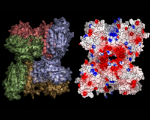 Biochemistry
Biochemistry
